I have a directory with multiple fasta file named as followed:
BC-1_bin_1_genes.faa
BC-1_bin_2_genes.faa
BC-1_bin_3_genes.faa
BC-1_bin_4_genes.faa
etc. (about 200 individual files)
The fasta header look like this:
>BC-1_k127_3926653_6 # 4457 # 5341 # -1 # ID=2_6;partial=01;start_type=Edge;rbs_motif=None;rbs_spacer=None;gc_cont=0.697
I now want to add the filename to the header since I want to annotate the sequences for each file.I tried the following:
for file in *.faa;
do
sed -i "s/>.*/${file%%.*}/" "$file" ;
done
It worked partially but it removed the ">" from the header which is essential for the fasta file. I tried to modify the "${file%%.*}" part to keep the carrot but it always called me out on bad substitutions.
I also tried this:
awk '/>/{sub(">","&"FILENAME"_");sub(/\.faa/,x)}1' *.faa
This worked in theory but only printed everything on my terminal rather than changing it in the respective files.
Could someone assist with this?
